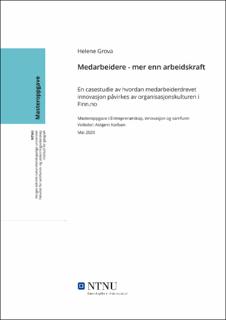| dc.contributor.advisor | Karlsen, Asbjørn | |
| dc.contributor.author | Grova, Helene | |
| dc.date.accessioned | 2021-09-28T17:54:22Z | |
| dc.date.available | 2021-09-28T17:54:22Z | |
| dc.date.issued | 2020 | |
| dc.identifier | no.ntnu:inspera:56116120:34927104 | |
| dc.identifier.uri | https://hdl.handle.net/11250/2785190 | |
| dc.description.abstract | I organisasjoner som i dag opererer i markeder i kontinuerlig endring, blir utviklingsstrategiene
stadig viktigere. Et fokus på innovasjon har vært viktig for å møte utviklingskravet, samtidig
som nye former for innovasjon har kommet til. Medarbeiderdrevet innovasjon kan være med å
møte utfordringene som oppstår i et forretningslandskap hvor det ikke finnes én sikker
utviklingsplan. Med dette som utgangspunkt, vil denne studien se nærmere på hvordan Finn.no
bruker organisasjonskulturen som en styrke i deres arbeid med medarbeiderdrevet innovasjon.
Gjennom å definere hvilke komponenter organisasjonskulturen deres består av, ønsker jeg å se
på hvordan de bidrar til å fremme medarbeiderdrevet innovasjon hos Finn.no.
For å besvare studiens problemstilling har jeg benyttet meg av en kvalitativ tilnærming i
datagenereringen. Underveis i forskningsprosjektet har jeg gjennomført fem intervjuer med
ansatte hos Finn.no. I tillegg baseres studien på en dokumentanalyse av tre artikler, et
podcastintervju med HR direktøren i Finn.no og bok som har analysert Finn.no sin
organisasjonskultur i 2019.
Oppgaven baseres på et teoretisk rammeverk som omhandler organisasjonskulturelle
drivkrefter som fremmer medarbeiderdrevet innovasjon. På bakgrunn av de empiriske funn har
jeg kommet frem til at Finn.no sitt arbeid med medarbeiderdrevet innovasjon påvirkes av
organisasjonskulturen, gjennom drivkreftene lederstøtte, autonomi, samarbeid og internt
organisasjonsklima. Til tross for at det er en tydelig sammenheng mellom drivkreftene,
kommer det frem i studien at hver drivkraft består av komponenter som er individuelle. Disse
funnene viser at organisasjonskulturen består av alle drivkreftene, selv om ikke Finn.no
nødvendigvis praktiserer hver komponent fullt ut. | |
| dc.description.abstract | For businesses that operate in rapidly changing markets, does development strategies become
more important. An innovation focus has become essential to meet the demand for
development, at the same time new forms of innovation have progressed. Employee-driven
innovation can contribute to solving the challenges in the business landscape where there is no
general and final development strategy. Based on this situation, this thesis will examine how
Finn.no utilizes its organizational culture as a strength in their work with employee-driven
innovation. By defining which components make up the organization culture I'll be able to
understand how they contribute to promoting employee-driven innovation at Finn.no.
In order to answer the thesis question, I have utilized a qualitative approach. I have conducted
five interviews with employers at Finn.no during the research process. In addition to this, a
document analysis of three articles, one podcast interview, and a book on Finn.no's
organization culture in 2019 has been conducted.
The thesis is based on a theoretical framework including driving forces of an organizational
culture that cultivates employee-driven innovation. Based on the empirical evidence, the thesis
concludes that Finn.no's work on employee-driven innovation is affected by the organization
culture through the driving forces leader support, autonomy, collaboration, and the internal
organizational climate. Despite an evident correlation between the driving forces, does the
study show that each driving force is consists of individual components. The results indicate
that Finn.no's organization culture is made up of all four driving forces, even in the times when
they're not practicing each distinct component to the fullest. | |
| dc.language | | |
| dc.publisher | NTNU | |
| dc.title | Medarbeidere - mer enn arbeidskraft | |
| dc.type | Master thesis | |
